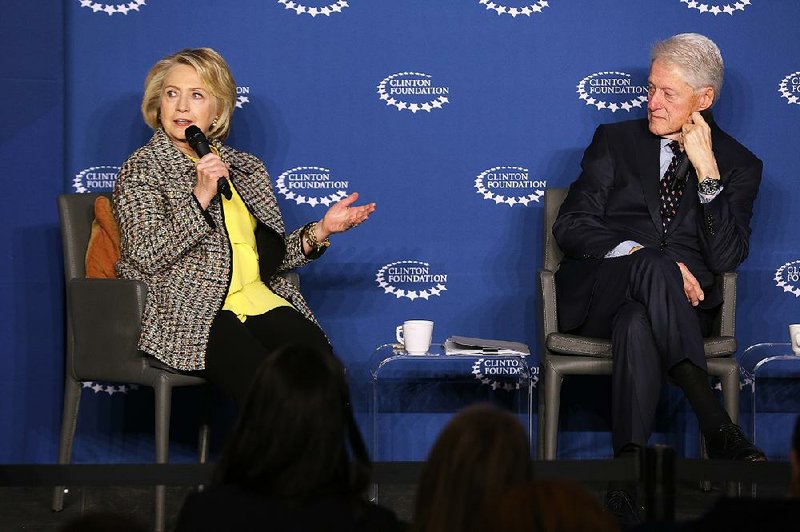Rejecting "trickle-down economics," former President Bill Clinton stressed the importance of creating an economy that works for all Americans.
Speaking at a conference in Little Rock on domestic economic policy, Clinton spoke about the need for "shared prosperity" and ways to achieve it.
The 42nd president was joined at the Clinton Presidential Center event by former Secretary of State Hillary Clinton, plus a host of mayors, lenders, investors and community leaders.
Giving large tax breaks to the wealthy isn't the solution to the nation's economic ills, Clinton argued.
"I think if you grow the economy from the bottom up and the middle out, you can reduce inequality and increase opportunity and I think it is relatively less costly to do than trickle-down economics and the impact of the dollar is much higher," he said.
The theme of the day was "Economic Inclusion and Growth: The Way Forward."
With the help of PowerPoint-style slides, Clinton portrayed his two terms in office as a golden age for all Americans, with incomes rising sharply for all income groups.
While economic growth was also strong during President Ronald Reagan's two terms in office, it was skewed toward the wealthy and it was funded, in part, by deficit spending, he noted.
"As our late senator here, Dale Bumpers, said at the time, 'If you let me write $200 billion worth of hot checks a year, I'll show you a good time, too,'" Clinton said.
Americans, across the board, were lifted by a vibrant economy during the Clinton era.
Some did particularly well, he noted.
"In the years that I served, there was much more income increase in the middle and bottom levels," Clinton said.
Partly, low-income Americans benefited from the earned-income tax credit, which lifted the tax burden from the working poor. But there were other major initiatives, including the creation of the Community Development Financial Institutions Fund.
Started as a result of the Riegle Community Development Banking and Financial Institutions Act of 1994, the fund provides federal assistance for financial institutions in economically disadvantaged communities.
Today, there are almost 1,100 of the funds nationwide. Operating in all 50 states, they have assets of $185 billion, according to the Opportunity Finance Network, the "national association of community development financial institutions."
Other Clinton-era anti-poverty programs included Rural Empowerment Zones and the New Market Tax Credit, which aimed to spark growth in some of the nation's poorest areas.
The gap between rich and poor has grown since Clinton was president and the trend is troubling, he argued.
"The levels of inequality in growth are unsustainable," he added.
Hillary Clinton spoke about how difficult it is for poor people to borrow money.
Hardworking small-business owners struggle when credit is too tight, she said.
"A woman told me in Denver one day that more dreams die in the parking lots of banks than anywhere else in America," Hillary Clinton said.
Darrin Williams, chief executive officer of Southern Bancorp, also emphasized the economic barriers that have been erected in many poor communities.
"In the state of Mississippi, there are more storefront payday lenders than there are McDonald's, Burger Kings and Starbucks combined," he said. "Our competition, often, is not some bank. It's often some predatory payday lender."
Institutions like Southern Bancorp are providing lending opportunities to smaller borrowers, Williams said.
Nearly half of all Southern Bancorp loans are for less than $10,000, he said.
Metro on 11/21/2019
